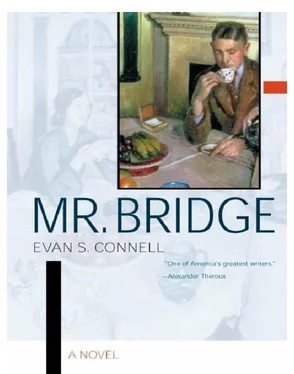Another thing he did not forget about that night at the ballet was the spectacle of Dr. Sauer wearing brilliant yellow socks. The psychiatrist had taken a seat in the middle of the first row; there he sat with his legs crossed, and the socks so bright they almost made a noise. They were not merely yellow, they were the yellowest possible yellow. Mr. Bridge, who invariably wore black silk socks with garters and black shoes, was astounded but not particularly surprised, because Dr. Sauer had turned up in the Terrace Grill of the Muehlebach wearing a green-checked vest with glass buttons, cordovan loafers, striped Italian trousers, and other such items. Frequently he wore a large, loose, blue Spanish beret, which he had bought one summer in Valencia.
During intermission they met in the lobby. Mr. Bridge introduced Ruth.
Later she remarked, “He’s mad!” and Mr. Bridge laughed because that was his own opinion.
“Did you notice those socks?” he asked.
And Ruth said, “They’re great! I wish you’d wear something jazzy.”
He tried to imagine himself wearing a pair of yellow socks. He could see himself wearing them at home, as a joke, but that was all. He tried to imagine wearing them to the office, and he had no trouble seeing the expression on Julia’s face.
Whether it was Ruth’s comment or only the sight of the yellow socks, he did not know, but not long after the ballet he found many things reminding him of them. Each time he saw a pair of socks of any color he was reminded of Dr. Sauer’s socks, or if he saw anything yellow, even a banana. It was annoying. And inevitably, the more he determined to forget them, the more often he discovered himself thinking about them.
In an effort to rid himself of them he thought about them deliberately; and doing so he remembered the psychiatrist commenting at lunch one day that it is not what a man does that he later regrets but what a man has failed to do.
Then it seemed probable to Mr. Bridge that Alex Sauer had had a desire for yellow socks and rather than meditate on this he had gone straight out and bought them. Rather than risk some later regret he had simply bought them. There might be some sound psychological principle here. Indeed, he reflected, there might very well be considerable merit in this. He recalled how often he had denied himself some inconsequential object he wanted, denied himself a slight pleasure or satisfaction for no truly reasonable reason but only because his heritage argued against indulgence. Yet how rational was such an argument?
Without confiding to anyone what he had made up his mind to do, he took to pausing in front of shop windows in the hope that he might see something he wanted, which he meant to buy at once. He hoped that when he found the object he was seeking it would not be too expensive, or too ridiculous; however, it should be expensive enough to cause discomfort, and mildly absurd. It should be a thing which previously he would never have considered buying. And still it must be desirable, because this was intended as a little exercise in liberation, not one more punishment.
He looked at fur-lined gloves, suits, neckties, fedoras, and camel’s-hair overcoats. He looked at wristwatches that glowed in the dark, unusual cufflinks, stickpins, rings, and jeweled fountain pens. He did not want any of them.
He decided to look for something larger. He began to contemplate sports cars, which were a possibility because they had the advantage of being rather outrageous and yet were recognized as a permissible indulgence, and he found two or three which appealed to him. However, that was a lot of money to invest in what was essentially nothing more than an experiment so he decided not to buy another car.
One more week went by. He felt discouraged and a bit foolish, thankful nobody knew what he was doing. Also, it was galling that after examining most of the merchandise in dozens of store windows he could not find anything he wanted. He began to feel resentful toward Dr. Sauer, whose fault this was. The preposterous search was using up time — here a moment, there a moment. He calculated that he had wasted two or three hours.
One day at the Terrace Grill while grinding pepper into his salad he inquired about the yellow socks. What had become of them? Had they been thrown away? No, no, no, the psychiatrist answered as if it were a perfectly natural question, those socks had not been thrown away and if Mr. Bridge would like to see more of them he would wear them tomorrow. Mr. Bridge said that would not be necessary, he just happened to think of them for some reason, he was merely curious.
On his way back to the office he stopped at Woolf Brothers clothing store and picked out a red-plaid wool shirt which he did not like. He asked the clerk to giftwrap it, and he took it home and after dinner produced it and announced to the family that he had bought himself a present. While everybody watched, he opened the box.
There was not much reaction to the shirt. It was not grotesque. Not at all. His wife remarked that it was quite attractive and as winter was coming on it should be very practical and comfortable to wear around the house or in the yard. He had not expected this. He had thought there would be some laughter; then he himself could join in the fun and explain how he happened to buy it, all because of Dr. Sauer’s socks, so the entire business could be finished. But because nobody thought the shirt was amusing he could not make a joke of it; he was obliged to pretend he had bought the shirt because he liked it. Carolyn asked him to put it on. He did not want to, but he took it out of the box and went upstairs to the bedroom where he put it on. It scratched.
He wore his new shirt the rest of the evening while he read the Star and the Wall Street Journal and listened to the radio; and that night he hung it in the closet, knowing that every time he opened the closet door and saw the shirt he was going to be annoyed. He began to estimate how long he must leave it hanging in the closet before he could say he was tired of it and suggest giving it to the Salvation Army.
Ruth mentioned that she had seen Dr. Sauer at the Paseo football game. Mr. Bridge asked if she had spoken to him, and she said they had had a long talk after the game.
He was amused. “Did you indeed? And what have the two of you in common?”
“More than you think,” she replied in a manner he could not interpret.
“What sort of person is he?” Mrs. Bridge inquired. “I’ve never met him, though I’ve heard enough tales.”
“He reminds me of an owl,” she said. “He smokes like a stove and he’s totally out of his skull. I mean, really!” Having supplied this description, she added that she thought Dr. Sauer probably could dance very well, although she did not explain why she thought so. With a quizzical expression she turned to her father. “He said something actually sort of weird. He said I was going on a dangerous trip.”
“Pay no attention, the man is eccentric,” Mr. Bridge replied.
However, he continued to think about this remark. He was afraid he knew what it meant.
The high school drama department was planning to present an abbreviated production of Romeo and Juliet during the Christmas holidays. Tryouts were soon to be held. Ruth, hopeful of getting the heroine’s role, practiced at home, wandering through the house with a tormented expression while reading aloud from Four Tragedies. Occasionally she would stop in the front hall before the mirror, fling the hair out of her eyes, catch her lower lip between her teeth, and wrinkle her brow; and after observing herself for quite a long period of time she would continue wandering and reciting.
Читать дальше












